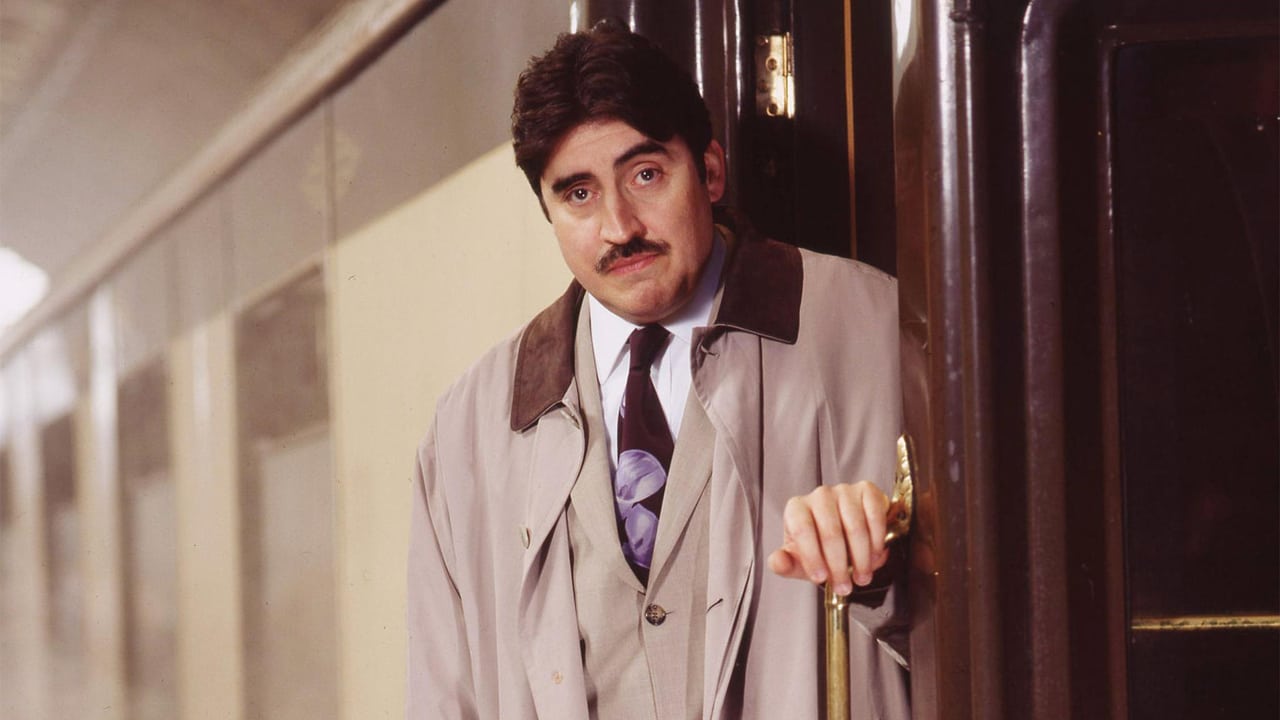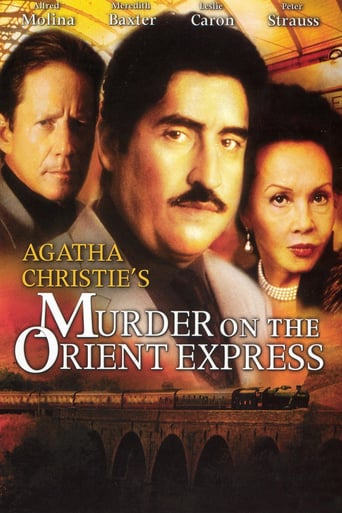

Simple and well acted, it has tension enough to knot the stomach.
... View MoreI didn’t really have many expectations going into the movie (good or bad), but I actually really enjoyed it. I really liked the characters and the banter between them.
... View MoreWorth seeing just to witness how winsome it is.
... View MoreThe movie really just wants to entertain people.
... View MoreI swear I really tried to watch this version of Murder on the Orient Express without comparing it to the 1974 Sidney Lumet film, but like this movie, I failed miserably. This made-for-TV movie lacks much of the class, style, and glamour of the '74 version (and the book for that matter). Talk of VCRs, fitness trainers, and computer styluses seem cheap in comparison to dragon kimonos, pipe cleaners, and butlers. The acting also lacks the class of the '74 film. With the exception of Leslie Caron, none of the other actors are worth mentioning in the same breath with Ingrid Bergman, John Gielgud, or Richard Widmark. The worst offender has to be Meredith Baxter. I couldn't watch a single second of her performance and not be reminded of the great Lauren Bacall. Plot points have been changed that really hurt the story. As Col. Arbuthnot so emphatically put it in the first, "Trial by twelve good men and true... is a sound system." Why change it to nine? This is just one example, I could go on and on about plot changes that I couldn't get past. Finally, Alfred Molina is no doubt a fine actor, but he's not Poirot (and I'm sure the screenwriters are as much to blame for this). I've read a lot of criticisms of Albert Finney's portrayal of Poirot, but to me, he nailed most of the idiosyncrasies that made Agatha Christie's character so unique. Sure, he went overboard at times, but Molina's character never even seems to try to be Poirot. And, what's with the love story involving Poirot? Like the rest of this movie, it's all wrong.In summary, if you want to watch Murder on the Orient Express, skip this one and check out the 1974 film. Or better yet, read the book.
... View MoreAlfred Molina stars as the Belgian detective Hercule Poirot who even in a modern age of computers still prefers his little gray cells even though one of the suspects in this modernized 21st century remake of Murder On The Orient Express is a dot com millionaire. The little gray cells still work pretty well and as we know Molina comes up with two solutions for the murder.Which is of Peter Strauss a rather crass and wealthy American who is getting death threats and he wants to know the source. When Molina turns him down later that night on the train Strauss is stabbed several times in his sleep. The officials on the Orient Express ask Molina to take charge of the investigation while a landslide blocks their path.For anyone who has seen the big screen version which contained an all star cast I won't go into details. But that version is set at a time when traveling on the Orient Express was a matter of class and elegance and you got performances of the cast reflecting that. Agatha Christie stories be they Miss Jane Marple, Hercule Poirot, or Tommy&Tuppence should always stay in the period they are written in. They lose so much when they are not.Standing out among the passengers are Meredith Baxter as a minor American TV actress and Leslie Caron as the widow of a South American dictator.Compared to the big screen version this one is good root beer as opposed to elegant champagne.
... View MoreIt follows quite faithfully the original story but the modernizing is very disturbing... Moreover as a huge fan of David Suchet, I can't see anybody else in this role... One of the other comments talks about Poirot being shown in love with a young Russian lady "who is given the name of the original old lady on the train"... I think the author is mistaken Countess Vera Rossakoff (a Russian jewel thief met in another story and, even if it has never been expressed, with whom Poirot is secretly in love) and Princess Dragomirov (original Russian character in "Murder on the Orient Express"). Anyway, the author of this note is right when saying that Princess Dragomirov is unnecessarily replaced by the widow of a South American dictator... In the original version, Poirot proves that the handkerchief with a "H" on it is Princess Natalia Dragomirov's by explaining that the "N" in Russian alphabet looks like an European "H". In this version, it's much more complicated to explain... Even Poirot could not have made this out!
... View MoreIt is Alfred Molina's great misfortune that, in portraying Hercule Poirot, he has been preceded by Peter Ustinov, Albert Finney, and David Suchet. Had this not been true, we might have been tempted to give his performance a higher rating than it is now possible to do.The original novel by Agatha Christie (same title) is one of the greatest whodunits ever penned. For unknown reasons, Ustinov never did it. My guess is that, although his Poirot films were made after the timely death of the pernicious and much-despised Code, the prospect of a murderer getting away with the crime was still too daunting for Hollywood. Suchet has yet to make Orient, but then it was only last year ('07) that he finally did "Mrs. McGinty's Dead" (with, we hope, Ariadne Oliver). Suchet's voice is used for Poirot in the 2006 Orient Express video game.So finally, in 2001 a TV version of Orient is made with Alfred Molina in the key role. Alas. Molina is a talented actor. His portrayal of Poirot, while not definitive nor even close, is passable even pretty good in some ways. However, once we compare him with his predecessors (not to mention the literary original), the problems show up like fat, pendulous, juicy pimples (the kind we all loved to pop back in the day). We all know, for instance, that Poirot was fastidious to the point of school-marmish fussiness. Molina's Poirot is neat and that's about it. Molina's accent is a sort of generalized European, not the pointedly confrontational French that Poirot affected. Molina does use the catch-phrase "little grey cells", but he rattles them out because they're in the script, not because (as is the case) Poirot is obsessive about them. Indeed, Poirot's fundamentally obsessive character is de-emphasized to the point of vanishing. Molin'a Poirot seldom speaks of himself in the third person; Poirot does so rather a lot. His mustache is some short hair under his nose; Poirot's is a fashion statement and accessory that defines his dandified appearance. Molina doesn't wear gloves. Nor spats, but then the date of the mystery has been moved up to about the date the film was made. Anyone who by now believes I haven't made my case doesn't know Hercule.While Suchet is the best Poirot overall, Ustinov bears away the palm for best actor. He inhabits the role so effectively that we become unconscious of his imposing height and bulk. Finney, who appears in the 1974 Orient, lacks for little in the Poirotishness of his portrayal. This is a competition that Molina simply can't win.The plot of the 2001 film is, incidentally, pretty much the same as that of the novel and the 1974 film. Poirot is traveling from Istanbul on the famous Orient Express. He shares the first class car with a diverse set of individuals. One of them, a highly unpleasant person (Ratchett) is stabbed to death in the dead of night. There are plenty of clues in fact, as Finney's Poirot observes and Molina's does not, there are too many of them. The train is stalled in its journey (snow slide in 1974, rock slide in 2001) and the railway's CEO commissions Poirot to find the killer. Through patient questioning and separating false clues from real ones, Poirot does so twice. If you don't actually know the plot already, your cultural deprivation is truly unfortunate.The problem with the 2001 production, however, runs deeper than merely the star. It's virtually the whole cast and what the update in time has done to their roles. The update from 1935 to c.2001 was apparently made because the producers figured that education has been so inadequate recently that viewers would never figure out what a White Russian (Princess Dragomirov) is, nor understand references to the Lindburgh kidnapping, nor fail to be puzzled by people going to Iraq for actual constructive purposes (archaeology), nor well, you get the gist.The result is that we have characters who are updated but far less interesting. As for the participating actors: recall that in 1974 we get Martin Balsam, Richard Widmark, Wendy Hiller, Lauren Bacall, Ingrid Bergman, Sean Connery, Michael York, Vanessa Redgrave, Anthony Perkins, John Gielgud, well, again you get the gist. Want a cast list of the 2001 film? Well, there's Leslie Caron, and Who? and Whom? and What? and Which? and and and well, and a group of actors, most of whom are still working. They appear primarily in small roles in TV series episodes and in fairly little-known films. The upshot is that we get OK performances of a fairly uninspired script, and that's about it. The exception is from the one fine actor in the group, Leslie Caron. That's the upside. The downside is that her performance is deeply informed by that of Wendy Hiller as Princess Dragomirov. In this film the character becomes Señora Alvarado, the widow of a fairly nasty Latin American dictator. The problem here is that the character has way more social standing than would someone coming from such a sleazy background. She is in fact treated as the royalty Dragomirov was. That is, the character doesn't really compute in order to keep character relationships as they were before the rewrite, Alvarado had to be accorded deference even Eva Peron didn't get in exile. Still, Caron manages to convince us of her bona fides. As I said, she's good.The cold, hard fact is that there are quite a few things on TV that are better than this remake. That's something we can't say about the 1974 original. The Poirot of the remake, Alfred Molina, is a pretty good actor but for whatever reason he has seriously misconceived the part he plays and as Poirot he winds up in 4th place in a field of 4. The picture, alas, winds up in about 9th place in a field of 2.
... View More